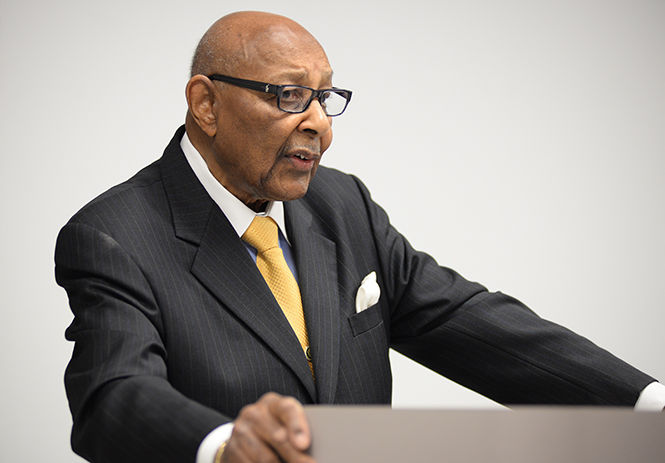Ambassador Stokes discusses diversity, stop-and-frisk laws
Louis Stokes, former Congressman and Kent State’s current President’s Ambassador, spoke to sociology and justice majors Wednesday, Sept. 17, 2014 about his involvement in the Terry v. Ohio case that he argued in the U.S. Supreme Court in 1968. He related this court case to recent events involving police brutality such as Ferguson.
September 18, 2014
Louis Stokes, former Ohio congressman and the Division of Diversity, Equity and Inclusion’s current President’s Ambassador, told social science students about what it will take to change the relationship between police and the communities they serve, particularly African-Americans, and revise stop-and-frisk laws yesterday in Merrill Hall.
Stokes discussed the 1968 U.S. Supreme Court case Terry v. Ohio, in which he represented John W. Terry, a black man convicted of carrying a concealed deadly weapon which a Cleveland detective seized by removing his overcoat without a warrant.
Terry was with one black man and one white man at the time. Stokes argued the search was a violation of Terry’s 4th Amendment rights, which protects citizens from unreasonable searches and seizures without a warrant.
“One of the justices asked the detective why he approached Terry, and he [the detective] said, ‘In all honesty, I just didn’t like them,’” Stokes said.
In an 8-1 decision, the Supreme Court ruled the detective’s actions were not in violation of the 4th Amendment.
Stokes said the Supreme Court’s decision set what are now referred to as “Terry Frisk Guidelines” that specify the conditions under which law enforcement can stop-and-frisk people on the street. The decision became precedent for future cases and set standards for reasonable search and seizure and stop-and-frisk procedures that allow officers to administer a brief pat-down of a person’s clothing if they reasonably suspect someone to be armed and dangerous, according to the Legal Information Institute at Cornell University Law School.
Stokes said a 2012 Wall Street Journal article reported that the New York police departments stop-and-frisks were at an all-time high at nearly 700,000 in 2011, 87 percent of which involved African-Americans and Hispanics. Only 12 percent of the stops resulted in an arrest or received summons and the rest were not charged.
He said the discrepancy between the high volume of stop-and-frisks and low arrest percentage is due to a variety of factors. One that “deeply concerns” him is the “problem of having our cultures segregated.”
“When you talk about the police officers who are raised in all-white communities, all-white schools and have shared in that community’s opinions and ideas about black people, then given the job to go into a black community where he does not live and exercise authority over those people, he brings with him that background that he grew up with, and he thinks that way,” Stokes said. “You cannot change that by speaking to the individual. You have to change the culture of a country.”
Stokes ended the discussion by taking questions from the audience during which he commented on the recent events in Ferguson, Missouri. He talked about the way in which unarmed, African-American teen Michael Brown was shot and killed by white police officer Darren Wilson and the strife caused between law enforcement and community members.
“Ferguson is a case that is not going to go away,” Stokes said. “If the officials in charge there do not charge this police officer with murder, I think you’re going to have a very explosive situation in that city.”
Stokes said the situation highlights the problem of racial disparities regarding police authority.
“Here’s a city that’s 64 percent black, and the police department has 57 police officers, and only three of them are black,” Stokes said. “There’s something wrong with that picture…They’ve got a lot of work to do there in terms of race relations, and they need to look at themselves in terms of ‘how do you let this happen’?”
Chelsea Arihilam, a sophomore nursing major, said she attended Stokes’ lecture because her Black Experience class inspired her to become more knowledgeable about current events.
“It made me realize racism in America is still very alive,” Arihilam said. “We don’t really think of it as an importance to us right now as college students, but we should realize that this is very important and will affect us.”
Sociology department chair Richard Serpe worked with the Division of Diversity, Equity and Inclusion to bring Stokes’ talk to select majors because he was early to raise questions with respect to police and community.
Although he lost the case in 1968, Stokes said he is proud to have helped established the Terry Frisk Guidelines that are taught to police officers and young lawyers.
“Police in America have strayed a long distance from the intentions of the justices in the original Terry v. Ohio case,” Stokes said. “Eventually, I don’t know what we’re going to be able to do about it because, as I stand here tonight, this is something I tried to change 50 years ago, so for 50 years the police have refused to follow the law and are still interpreting the law their own way in every major inner city. I think eventually it will have to go back to the court. It’s going to take that in order to be able to bring some sanity to this position.”
Contact Christina Bucciere at [email protected].

























